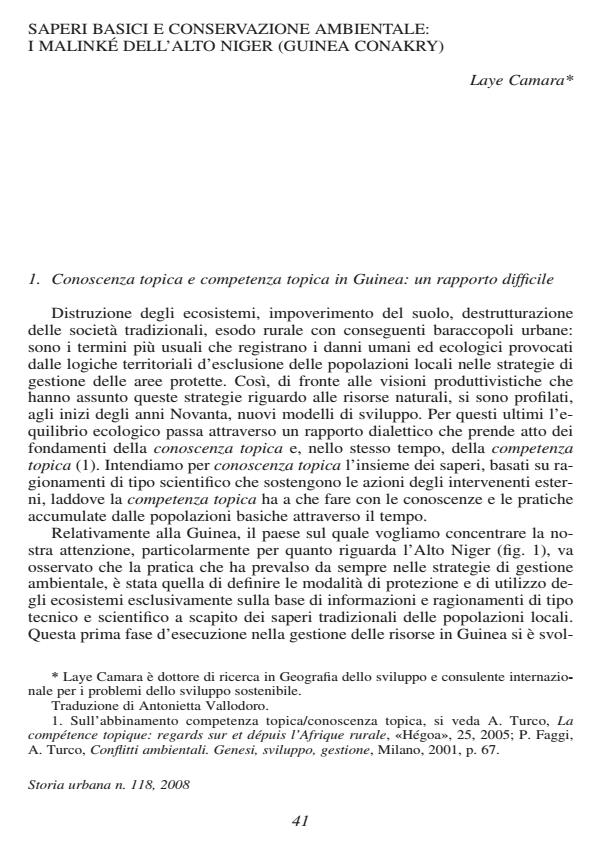Saperi basici e conservazione ambientale: i Malinkè dell'Alto Niger (Guinea Conakry)
Journal title STORIA URBANA
Author/s Laye Camara
Publishing Year 2008 Issue 2008/118
Language Italian Pages 27 P. 41-67 File size 1089 KB
DOI
DOI is like a bar code for intellectual property: to have more infomation
click here
Below, you can see the article first page
If you want to buy this article in PDF format, you can do it, following the instructions to buy download credits

FrancoAngeli is member of Publishers International Linking Association, Inc (PILA), a not-for-profit association which run the CrossRef service enabling links to and from online scholarly content.
Traditional knowledge and environmental conservation: Malinké of Upper Niger-Guinea Conakry - The exclusion of local populations from the management of the ecosystems is responsible for human and ecological damages such as the destruction of ecosystems, soil impoverishment, disarticulation of traditional societies, rural exodus, etc. A fundamental stage prior to the enactment of any policy of sustainable development and preservation of natural resources is to understand the relation of man with the environment through the analysis of men’s socio-cognitive representations of the external world. Unfortunately, until now, the programs for the preservation of natural resources in Africa have neglected this work of reconstruction and valorisation of traditional modalities of preservation of the environment, and have limited themselves to the techno-scientific or purely ideological and visionary rationales suggested by the agents of development or the administrators. The populations that live and inhabit the environment are excluded, de facto when not also de iure, from its management. This gap has opened the way, on a large scale, to claims, often conflicts, that regard the acknowledgement of the territorial legitimacy of the basic actors in the management of the protected areas. Through the example of the Malinké in the Upper Niger and the experience of the Pnhn(National Park of the Upper Niger) management, the paper highlights the importance of valorising traditional African knowledge in environmental management projects. The present study introduces the Malinké cognitive system by focusing the attention on the intellectual control process of the environment, which is considered the foundation of all practices of transformation and, at the same time, of protection of natural resources in the peripheral zones of the Pnhn. These practices are real traditional techniques of sustainable management of the natural resources of the village territories.
Laye Camara, Saperi basici e conservazione ambientale: i Malinkè dell'Alto Niger (Guinea Conakry) in "STORIA URBANA " 118/2008, pp 41-67, DOI: